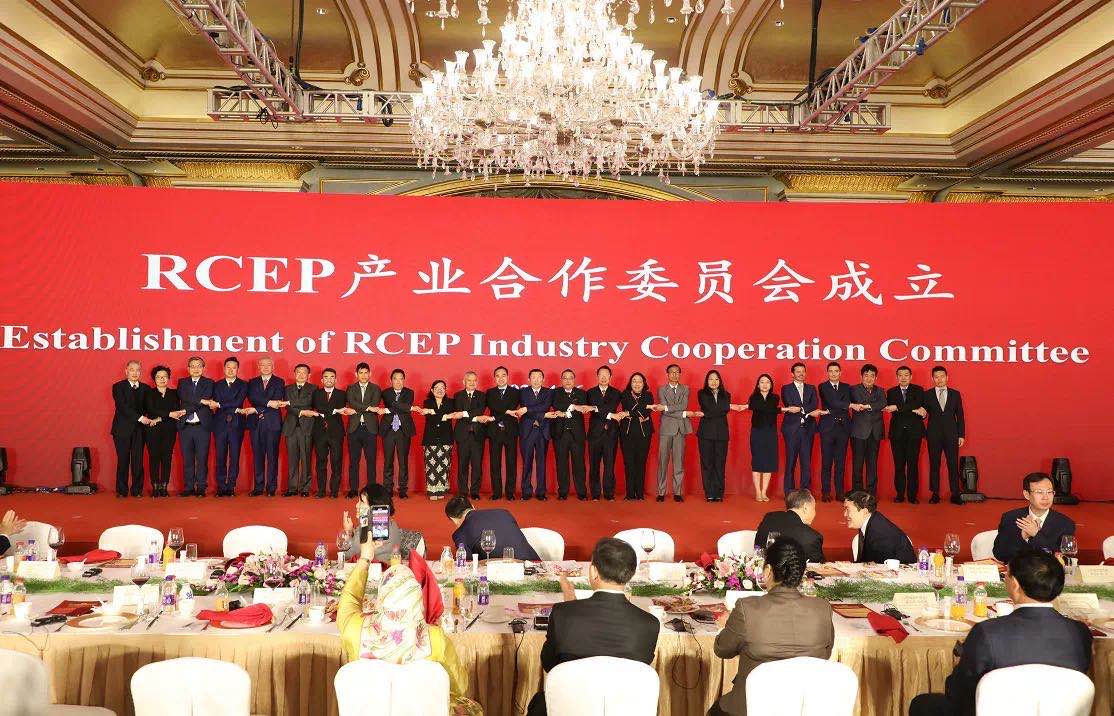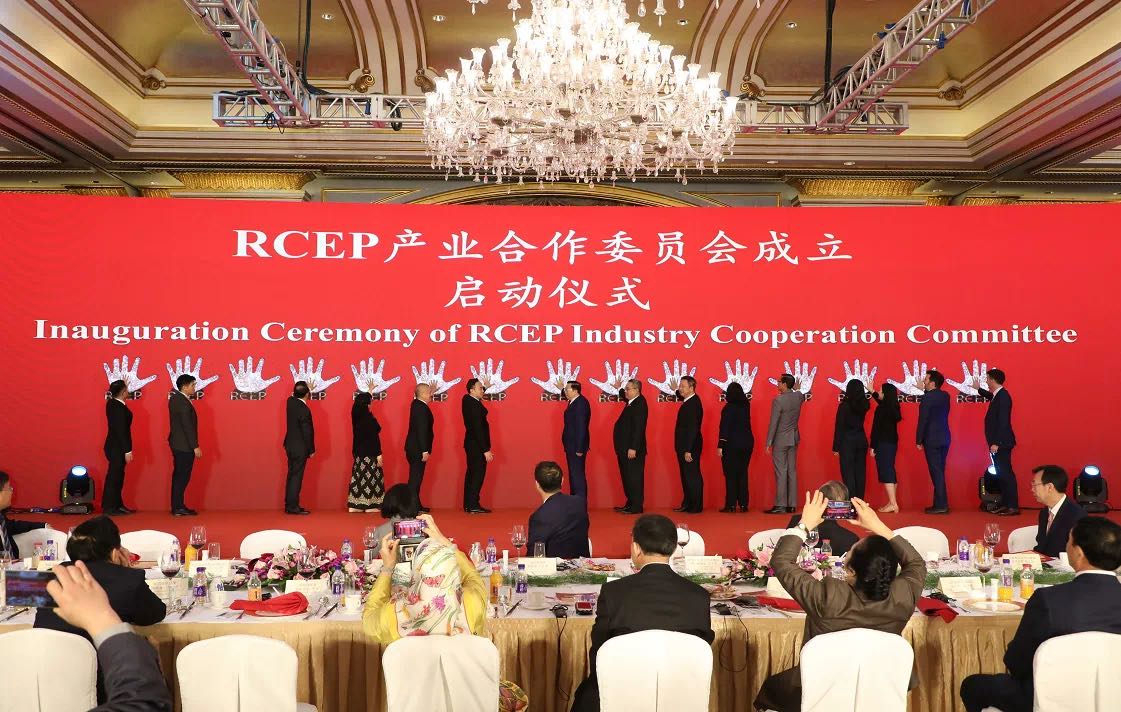The Establishment of RCEP Industry Cooperation Committee

On April 16, the RCEP Industry Cooperation Committee was established in Beijing. The representatives of the business communities of 15 RCEP member states jointly expressed that they will close regional industrial cooperation and work together to promote the implementation of the RCEP agreement.
The Regional Comprehensive Economic Partnership Agreement (RCEP) was signed on November 15, 2020. The RCEP, composed of the ten ASEAN countries and China, Japan, South Korea, Australia, and New Zealand, is a free trade zone with the largest population, the largest economy, the most diverse membership structure, and the greatest potential for development in the world.
The cooperation committee is mainly composed of representatives of the business communities of 15 RCEP member states. At the inauguration ceremony, Xu Ningning, Executive President of the China-ASEAN Business Council, Shen Guofang, Executive President of the China Foundation for International Studies of the Ministry of Foreign Affairs, and Yu Ping, Former Vice President of the China Council for the Promotion of International Trade, and representatives of embassies of Brunei, Cambodia, Indonesia, Laos, Malaysia, Myanmar, the Philippines, Singapore, Thailand, Vietnam, Australia, and New Zealand in China pressed the fingerprints to start the establishment of the cooperation committee.
The Chinese members of the cooperation committee include China Machinery Industry Federation, China National Light Industry Council, China Building Materials Federation, China Information Technology Industry Federation, China Petroleum and Chemical Industry Federation, China Packaging Federation, China Association of Trade in Services, China Communications and Transportation Association. Leaders of these associations attended the inauguration ceremony and stated that they will actively connect with the RCEP business community and assist enterprises in enhancing cooperation.

Zaw Min Win, President of The Union of Myanmar Federation of Chambers of Commerce and Industry; Francis Chua, Permanent Honorary President of the Philippine Chamber of Commerce and Industry; Huang Guangfang, Vice President of the Vietnam Chamber of Commerce and Industry; Thanongsinh Kanlagna, Vice President of the Lao Chamber of Commerce and Industry; Musa bin Haji Adnin, Vice President of the Brunei Chamber of Commerce and Industry; Douglas Foo, President of the Singapore Manufacturing Federation; and Vice Chairman of the China Committee of the Indonesian Chamber of Commerce and Industry, President of the Myanmar Chinese Chamber of Commerce, President of the Brunei Chinese Chamber of Commerce, President of the Malaysian Small and Medium Business Association, Vice President of the Malaysia-China Chamber of Commerce, President of the Malaysia Chamber of Commerce and Industry in China, the Secretary-General of the China-Thai Business Council, the Secretary-General of the China-Indonesia Chamber of Commerce, and the Executive Manager of the Philippines Chamber of Commerce and Industry in China. A total of 300 people attended the inauguration ceremony.
As early as the negotiation of the RCEP agreement in 2018, the China-ASEAN Business Council (CABC) recommended the establishment of an RCEP Industrial Cooperation Committee to strengthen the industrial cooperation of the business community. On February 5 this year, CABC took the lead to launch the China Business Community Initiative to Jointly Promote Regional Business Cooperation Under RCEP. This initiative was initiated by the CABC and 75 national industry associations and relevant industry cooperation committees to express their willingness to strengthen the construction of mechanisms with the business communities of the member states of the RCEP region and form an RCEP Industrial Cooperation Committee. After the Chinese business community initiative was issued, representatives of the 14 other RCEP countries’ business communities discussed with the Chinese representatives that the establishment of the cooperation committee is really necessary.
Recently, the CABC took the lead in establishing the cooperation committee in accordance with the cooperation needs and mutual discussions of the RCEP business community. Within the RCEP region, China and ASEAN are each other's largest trading partners. CABC is one of the dialogue and cooperation mechanisms between China and ASEAN.
Xu Ningning, Executive President of the China-ASEAN Business Council, said that the fact that the committee was able to prepare for the establishment in a short period of time reflects that the business communities of RCEP member states fully recognizes the significance of RCEP construction, and that the business communities are working together to enhance friendly cooperation and jointly seize open opportunities. The positive aspirations of the business communities reflect the positive actions of the industrial and commercial sectors in the implementation of RCEP.
The leader of the committee’s preparatory group and executive director of the China-ASEAN Business Council, Lv Kejian, said that the purpose of establishing the cooperation committee is to implement the RCEP Agreement and the RCEP Leaders’ Joint Statement, and to strengthen the relationship and friendly cooperation between the RCEP member states’ chambers of commerce, industry associations and key enterprises so as to give full play to the role of business associations in RCEP industry cooperation, promote trade and investment cooperation between RCEP member countries, and boost new development of RCEP regional economic and trade cooperation.
The Rotating ASEAN Chair, Brunei's Ambassador H.E.Mr.Pehin Dato Rahmani Dato Basir, Cambodian Ambassador H.E.Madam Khek Caimealy Sysoda, Lao Ambassador H.E.Madam Khamphao ERNTHAVANH, Thai Ambassador H.E.Mr. Arthayudh Srisamoot and representatives from the ten ASEAN countries, as well as the CEO of the Australia Chamber of Commerce in China, the Secretary General of the Japan Chamber of Commerce in China, the general manager of the North China region of CapitaLand Singapore, the CEO of Singapore UOB (China) Co., Ltd., and Sembcorp (China) Investment Senior Vice President of Co., Ltd., Chief Representative of Bank Indonesia Beijing Representative Office, Chief Representative of Philippine BDO Bank China, and Vice President of Thailand Banpu Investment China Co., Ltd. attended the inauguration ceremony at the main venue in Beijing and they all believe that the establishment of the committee is a common need of all parties.
Liu Xin, Executive Secretary General of the China-ASEAN Business Council, introduced that the committee is an unofficial, non-profit, voluntary RCEP business and industry cooperation consortium. The committee has 100 members from 15 member states, mainly representative and well-known leaders of the Chamber of Commerce and Industry. The main functions of the committee include: providing trade and investment information and business consulting in key industries; hosting or co-organizing conferences and exhibitions related to promoting RCEP industry cooperation; promoting exchange visits, personnel training, and personnel exchange; assist RCEP member countries to expand business relations.
At the inauguration ceremony, Hakhee Jo, Vice President of the international affairs of Korea International Trade Association, said that as global economic uncertainty increases and some countries implement trade protection policies, RCEP, the largest free trade agreement in the world, will expand trade and inject new vitality into global economy. The Korea International Trade Association (KITA) fully supports the RCEP agreement and is sparing no effort to promote the domestic ratification process of RCEP. There is still a lot of work to be done in the construction of RCEP, and the establishment of the RCEP Industry Cooperation Committee is just the right time.
Ju Dongying, President of the Japan-China Science &Technology and Culture Center, said that the Japan-China Science &Technology and Culture Center has more than 40 years of experience in Japan-China industrial cooperation, science, technology, culture and education. It will fully support the work of the RCEP Industrial Cooperation Committee and assist the industrial development of the RCEP economic and trade circle. Based on economic, trade and industrial exchanges, it contributes to multilateral cooperation in the Asia-Pacific region.
Eleanor Mak, Chairman of the Australia-ASEAN Business Council, stated that Australia has close economic and trade relations with other RCEP member states. To fully realize the potential of RCEP, all parties need to cooperate actively. The establishment of the RCEP Industry Cooperation Committee is an important measure. The Australia-ASEAN Business Council and the Australian Chamber of Commerce and Industry look forward to enhancing cooperation with the business communities of all member states of RCEP.
Michael Barnett, CEO of the Auckland Chamber of Commerce of New Zealand, said that as a representative of New Zealand, it’s very pleased to see the establishment of the RCEP Industrial Cooperation Committee, which is conducive to promoting trade and investment cooperation among RCEP member countries in the open market, which is conducive to regional economic growth and recovery.
Neak Oknha Pung Kheav Se, Chairman of the Association of Khmer Chinese in Cambodia and Chairman of the Cambodia Canadia Bank, said that Cambodia has great potential for economic growth and broad room for industrial upgrading. The Association of Khmer Chinese in Cambodia is willing to assist companies from other member states including RCEP to invest in Cambodia. The establishment of the RCEP Industrial Cooperation Committee is of positive practical significance. The Association of Khmer Chinese in Cambodia will cooperate with the China-ASEAN Business Council and business communities of 15 member states of the RCEP Industrial Cooperation Committee to jointly promote the new development of the RCEP regional industry.
【图文来源于网络,如有侵权,请联系我们删除】


